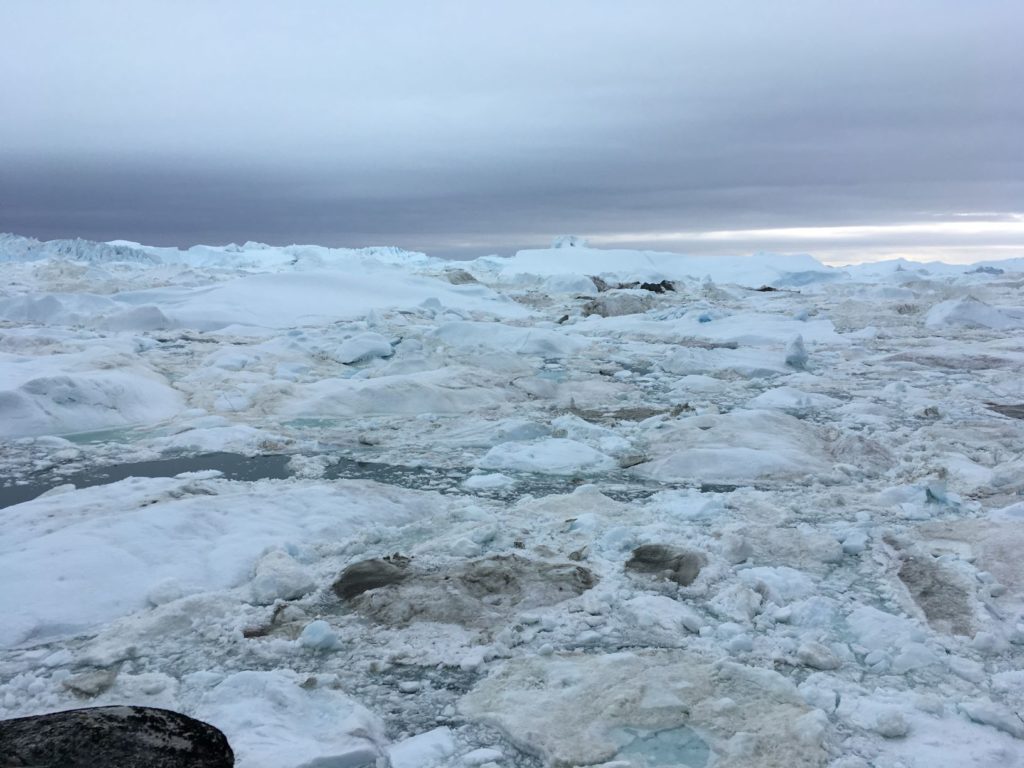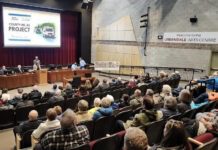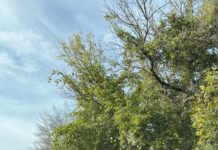Over the past few months, there has been a lot of talk and debate in this newspaper about climate change. Some people have warned of the serious effects of climate change worldwide, and others claimed that it is simply propaganda, meant to make money and garner votes for a particular political party or agenda.
There is something to be said about climate change as a natural phenomenon. I recently had the chance to visit the Arctic on an adventure cruise which had many specialists on board, all of whom have their own connection to the issue of global warming and climate change. The geologist on board, Stephen Morison, has been working in the Arctic since the 1970s, and says that the earth does naturally go through periods of warming and cooling.
“As a geologist who looks at things over thousands of years, climate is always changing and is unpredictable,” he said during a panel discussion on climate change aboard the ship. That being said, he says that the rate of change they have been seeing over the past few years in the Arctic is “alarming.”
All the other specialists on the panel (which included biologists, a botanist, a glaciologist, and archeologist) agreed. The warming of the sea is affecting the migration of bird populations and marine mammals. Ornithologist, Gary Donaldson, says they are seeing southern bird populations migrating further north, pushing less aggressive birds out of their natural habitat. The same thing is happening with Killer Whales appearing further and further into the Arctic, preying on ice-adaptive marine mammals like Narwhal and Beluga.
The changing climate is also affecting land animals in the north. Melting permafrost in the summer months creates a marshy-like habitat which is different for animals like muskox, caribou and polar bears that are used to more frozen ground. When we were hiking in Dundas Harbour, on the shores of Devon Island in Nunavut, my feet sunk deep into the ground, and by the end there was a perpetual puddle in my hiking boots. Our guide, glaciologist Charlotte Mougeot, said she saw a huge difference in the amount of melting permafrost on the site from when she was there just a few years earlier. “There were always wetlands in there, but now you can barely navigate in the area without getting wet feet,” she said. “That was easily done before.”
When we hear about climate change, there is a lot said about its impacts on the natural environment (like Greenland’s ice sheet recently losing 11 billion tons of ice in one day this summer) and animal populations. It’s not often we hear about how it is affecting people, and the reality is it is affecting the people of the Arctic in devastating ways.

Whether you believe humans are contributing to the warming of the earth or not, there is no doubt that the pollutants that we are pumping into the air are affecting the planet. One of the foremost authorities on the north in Canada, explorer and author James Raffan, explains that, because of the cool temperatures, the Arctic acts as a sink for persistent organic pollutants (POPs) and heavy metals, like mercury and lead, that fall as precipitation and freeze into the ice. When this ice melts, high concentrations flow into the ocean and in turn get ingested by marine mammals and those that prey on them. Chief Physician at the Department of Occupational and Public Health in the Faroe Islands, Dr. Pal Weihe, has found that children there are showing cognitive impairments because of mercury in their system from eating traditional food sources like whales and seabirds. He says people in the Faroe Islands need to stop living traditionally or they will die.
One of the cruise ship staff, Robert Comeau, is a law student in Iqaluit and a staunch advocate for Inuit people. He says that, while he respects the science behind climate change, he doesn’t always understand it. What he understands is the loss of animal populations that Inuit depend on for food, and the loss of routes along the sea ice that his people use to get around in the winter. “It affects us in so many ways, I don’t even know where to begin,” he says. “I’ve had friends’ parents go through the sea ice in places they’ve been going for generations.”
For the people who live in the Arctic, there is no debate. The world is changing – quickly – and they are the ones who are feeling the effects the most. It may not be part of our everyday lives south of the arctic circle, but that doesn’t mean it isn’t happening and that we shouldn’t be concerned. Whether humans are the main cause or not, the discussion should be around what we can do to mitigate any potential impact we might have.
I had the pleasure of having dinner with Stephen, the geologist, after the climate change panel on the ship. He told me that, as a country, we are already moving in a positive direction to lower our emissions and be responsible world citizens. The biggest culprits, he says, are larger countries like China, with their 1.4 billion people, who aren’t taking the necessary steps to curb their impact.
After the climate change panel, one question was posed to the audience. What do you think YOU can do to address climate change? Each one of us is only a small piece of the puzzle. We can recycle, use reusable bags for shopping, walk and bike instead or driving, buy hybrid or electric cars. There is a laundry list of ways we can all lead more environmentally conscious lives, but how much of a difference does this actually make? It is easy to become complacent when we, as individuals, are doing everything we can to be environmentally conscious; but it doesn’t seem to make much of a difference on a global scale.
One woman in the audience made a good point. We can ensure that our country continues to set a positive example in combatting climate change on the world stage. We are lucky to live in a democratic society, where we have control over who we elect to run our country, and we are just heading into a federal election.
So, as the various candidates disseminate their platforms this Fall, pay attention to what they say about climate change. Is it on their radar? Do they have a plan for what Canada can do to play its part? Does it align with your own values and thoughts when it comes to climate change? We have the ability to decide who creates the policy on these issues, and we should be taking full advantage of that, if not for our own benefit, then for our friends to the north, who are depending on us in the more populated south to stand up and take notice. It is not only our right but our responsibility to do so.







